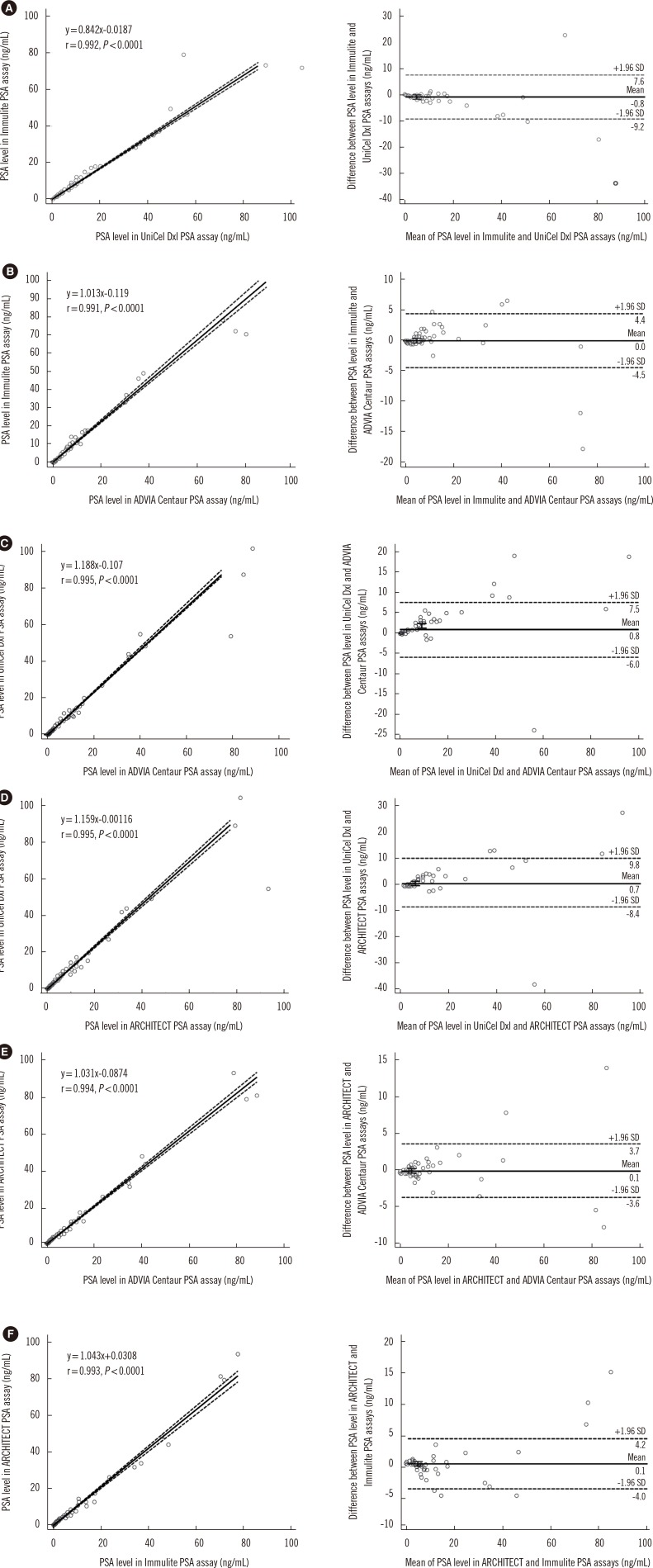Ann Lab Med.
2019 Jul;39(4):406-410. 10.3343/alm.2019.39.4.406.
Multicenter Comparison of Four Automated Immunoassay Analyzers for Prostate Specific Antigen
- Affiliations
-
- 1Department of Laboratory Medicine, College of Medicine, The Catholic University of Korea, Seoul, Korea. hjkkwon@catholic.ac.kr
- 2The Seoul St. Mary's Hospital IVD Medical Devices Development Center, Seoul, Korea.
- KMID: 2438890
- DOI: http://doi.org/10.3343/alm.2019.39.4.406
Abstract
- No abstract available.
Figure
Reference
-
1. Bozeman CB, Carver BS, Eastham JA, Venable DD. Treatment of chronic prostatitis lowers serum prostate specific antigen. J Urol. 2002; 167:1723–1726. PMID: 11912396.2. Sturgeon C. Tumor markers. In : Rifai N, Horvath AR, editors. Tietz textbook of clinical chemistry and molecular diagnostics. 6th ed. St. Louis: Elsevier;2018. p. 437–478. .3. Boccon-Gibod L, Djavan WB, Hammerer P, Hoeltl W, Kattan MW, Prayer-Galetti T, et al. Management of prostate-specific antigen relapse in prostate cancer: a European Consensus. Int J Clin Pract. 2004; 58:382–390. PMID: 15161124.4. Kort SA, Martens F, Vanpoucke H, van Duijnhoven HL, Blankenstein MA. Comparison of 6 automated assays for total and free prostate-specific antigen with special reference to their reactivity toward the WHO 96/670 reference preparation. Clin Chem. 2006; 52:1568–1574. PMID: 16762996.5. Critz FA, Williams WH, Holladay CT, Levinson AK, Benton JB, Holladay DA, et al. Post-treatment PSA < or=0.2 ng/mL defines disease freedom after radiotherapy for prostate cancer using modern techniques. Urology. 1999; 54:968–971. PMID: 10604691.6. Moul JW. Prostate specific antigen only progression of prostate cancer. J Urol. 2000; 163:1632–1642. PMID: 10799151.7. Gheiler EL, Tefilli MV, Tiguert R, Grignon D, Cher ML, Sakr W, et al. Predictors for maximal outcome in patients undergoing salvage surgery for radio-recurrent prostate cancer. Urology. 1998; 51:789–795. PMID: 9610593.8. Roach M 3rd, Hanks G, Thames H Jr, Schellhammer P, Shipley WU, Sokol GH, et al. Defining biochemical failure following radiotherapy with or without hormonal therapy in men with clinically localized prostate cancer: recommendations of the RTOG-ASTRO Phoenix Consensus Conference. Int J Radiat Oncol Biol Phys. 2006; 65:965–974. PMID: 16798415.9. Ang M, Rajcic B, Foreman D, Moretti K, O'Callaghan ME. Men presenting with prostate-specific antigen (PSA) values of over 100 ng/mL. BJU Int. 2016; 117(S4):68–75. PMID: 26890320.10. Gontero P, Joniau S, Van Poppel H. Radical prostatectomy for PSA> or =100 ng/mL prostate cancer. Eur Urol. 2008; 54:957–958. PMID: 18433984.
- Full Text Links
- Actions
-
Cited
- CITED
-
- Close
- Share
- Similar articles
-
- Evaluation of ACS : 180SE Automated Chemiluminescence Immunoassay System
- In Search of a New Prostate-Specific Antigen
- Evaluation of the Performance of Lumipulse G1200 for Tumor Marker Assays
- The Factors Influencing the Percentage of Free Serum Prostate Specific Antigen Levels in Men without Clinically Detectable Prostate Cance
- Evaluation of the Technicon Immuno I Immunoassay System


